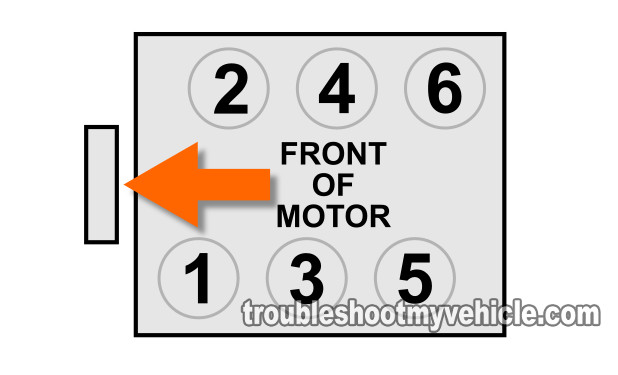What Tests Can I Perform To Find The Cause Of The Misfire Condition?

It is possible to find out exactly what's causing the misfire condition and/or misfire code on your 3.8L V6 equipped GM vehicle.
The very first thing that has to be done, is to identify the cylinder that is misfiring (or dead), then you can go about doing specific tests to find out if it's being caused by a lack of spark or fuel or enough cylinder compression.
The following is a list of tests that may need to be done to find the cause of the misfire problem. Normally, you'll only perform some of these tests:
- Read the diagnostic trouble codes with a scan tool. On OBD II equipped vehicles, you should see a specific cylinder misfire code that will tell you what engine cylinder is the one being affected.
- There's a good chance, that even tho' your vehicle is OBD II equipped, the PCM will not set a specific misfire trouble code, when this happens, you'll need to do a cylinder balance test (you can find it here: How To Do A Cylinder Balance Test (GM 3.8L V6)).
- On older vehicles (that are not OBD II equipped), you'll need to do a cylinder balance test to find out the missing (dead) cylinder. You can find this test here: How To Do A Cylinder Balance Test (GM 3.8L V6).
- Test the ignition system first. Which in the 3.8L V6 engine includes:
- Troubleshooting the spark plug wires.
- Troubleshooting the 3 ignition coil packs sitting on top of the ignition control module (ICM).
- Troubleshooting the spark plugs.
- Troubleshooting the ignition control module (ICM).
- Testing the compression of all engine cylinders.
- Testing the fuel injectors
- Check for vacuum leaks.
It seems like a long and complicated list, doesn't it? Well, don't worry, I'm going to show you how to test all of these systems and/or components so that you can find out what is the component that has gone bad and is causing the misfire code(s) (P0300, P0301, P0302, P0303, P0304, P0305, P0306) or the misfire condition. You'll find the links to all of these tests in the next page, at the end of the article.
Where Do I Find The Test Articles?
Finding the right information to troubleshoot the misfire condition on your GM 3.8L car or mini-van (Buick, Chevrolet, Oldsmobile, Pontiac) can be quite a time consuming process. So I've tried to make this ordeal a little easier by providing a lot of reliable and proven testing information (although you may still need a repair manual and other online sources of info). The links below will take you to specific tests to find out what causing your misfire condition:
- GM 3.8L Ignition System Tests (at: easyautodiagnostics.com).
- GM 3.8L Engine Compression Test.
- GM 3.8L Fuel Injector Noid Light Test.
- GM 3.8L Bad Fuel Injector Test.
You can find a complete list of GM 3.8L diagnostic tutorials here: GM 3.8L Index Of Articles.
What Tools Do I Need To Test The Misfire Code(s)?
Having the right tools to test and diagnose a misfire condition or misfire codes will make the difference between throwing money and time down the drain or saving money and time. With the right tools, you'll also save a lot of frustration.
Depending on what the root cause of the misfire is, you'll need several tools. Most of these you can buy online, none of these will break the bank and I'll make some recommendations on them. Here's a guide to some of the basic tools that can be and are used:
- Ignition System Tests:
- Spark tester.
- Multimeter.
- 12 Volt test light.
- Fuel System Tests:
- Noid light.
- Fuel pressure gauge.
- Multimeter.
- Engine Mechanical Tests:
- Compression tester.
Now of course, you'll also need basic hand tools like: screw-drivers, ratchet wrenches, sockets, etc. You'll also need a generic scan tool to retrieve the diagnostic trouble codes (DTC's) from the computer's memory. Keep in mind that using the right tool for the job will save you time, frustration, and /or keep you from damaging the component that you're testing.
To help you troubleshoot the issue on your specific vehicle, each article, presented here, will tell what tools you'll need and where to buy them.
Is This Something I Can Do? Or Do I Need To Take It To A Repair Shop?
Most of the tests that you'll need to perform on your GM 3.8L 6 cylinder equipped car or mini-van are simple and easy. Even someone with little practical ‘wrenching’ experience can easily accomplish them.
The deciding factor, to either troubleshoot the car or mini-van yourself or take it to an auto repair shop, is if you have or don't have the necessary tools and the time required to perform the tests. Here are a couple of questions to consider:
- Do I have all of the required info (such as repair manual, online testing info, etc.) to diagnose/troubleshoot the vehicle myself?
- Do I have the patience to work on my own car?
- Do I have the time it will take to diagnose and repair the vehicle myself?

If this info saved the day, buy me a beer!

